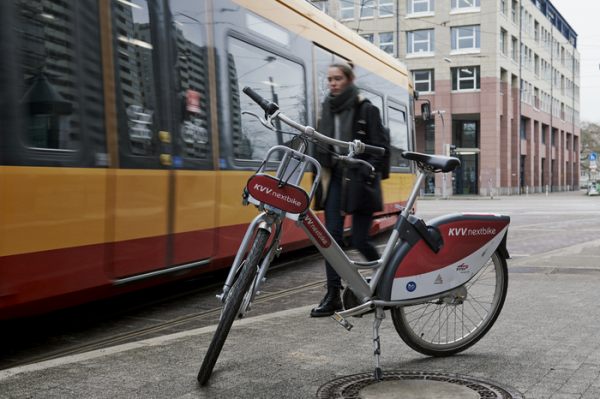Being mobile individually, at any time – without owning a car. To facilitate this, public transportation authorities cooperate with service providers for new forms of mobility such as bicycle sharing, car sharing, or ridepooling. Researchers of Karlsruhe Institute of Technology (KIT) studied how publicly available mobility options in the Karlsruhe region in the future can optimally fulfill the citizens’ needs. The result: Widespread availability of pooling and sharing services and improved public transportation will profit both – and reduce car traffic.
“In times of climate change, high fuel prices, and the aim to be independent from foreign energy imports, every saved kilometer of car traffic helps. The combination of public transportation with other forms of mobility promises additional savings potential,” Dr. Martin Kagerbauer of the KIT Institute for Transport Studies (IfV) states. With its “regiomove” project, the Karlsruhe Transport Authority (KVV) created a network of different mobility options that can be accessed digitally using an app or at mobility hubs – these are stations where users can easily change between different means of transportation.
Widespread Availability of Sharing and Pooling Options
The researchers simulated different future scenarios for the entire mobility supply in travel demand models to find out how this new mobility supply works best: “Sharing and pooling options can help increase public transportation use – but only if they are widespread and available throughout the region,” Kagerbauer says. “Currently, only up to ten percent of the population have access to such options, depending on which area they live in,” Tim Wörle of IfV adds. Increasing this percentage by 20 percent by spreading different sharing services to more rural areas could almost triple their share of trips. “The new options might still be of low significance in the overall trips. However, they can present many additional mobility options to the population beyond personal owned cars,” Kagerbauer explains.
Read more at Karlsruher Institut Für Technologie (KIT)
Image: According to KIT researchers, pooling and sharing options like bicycles can support public transportation (Photo Credit: Amadeus Bramsiepe, KIT)


